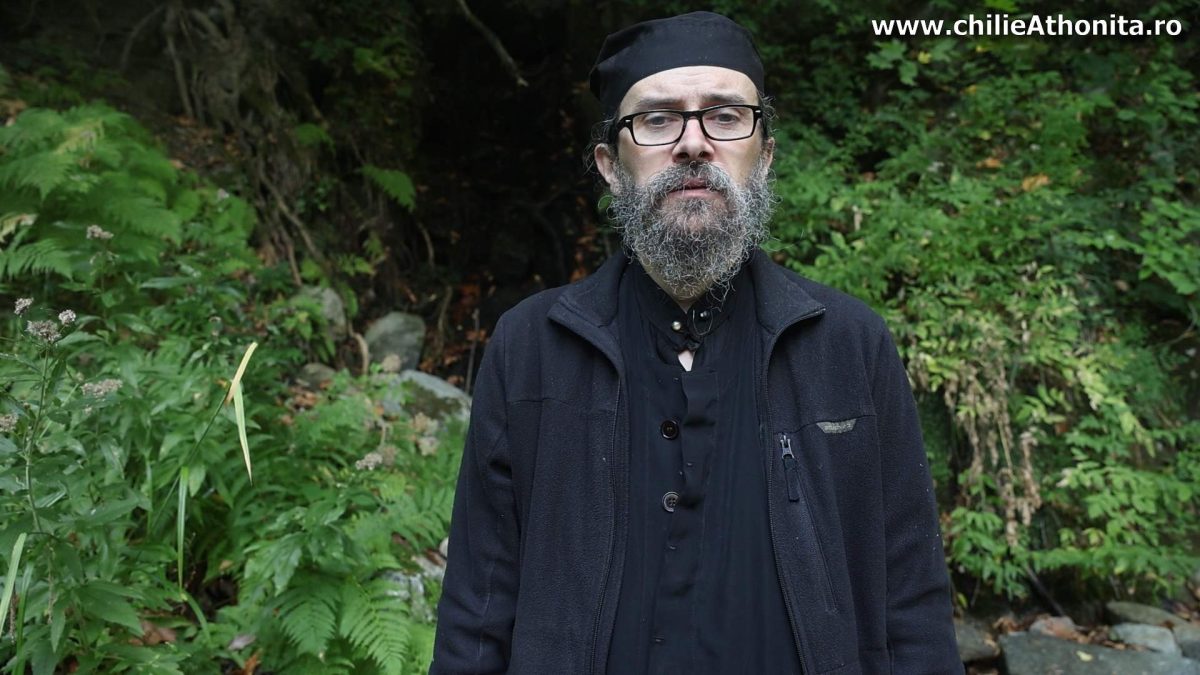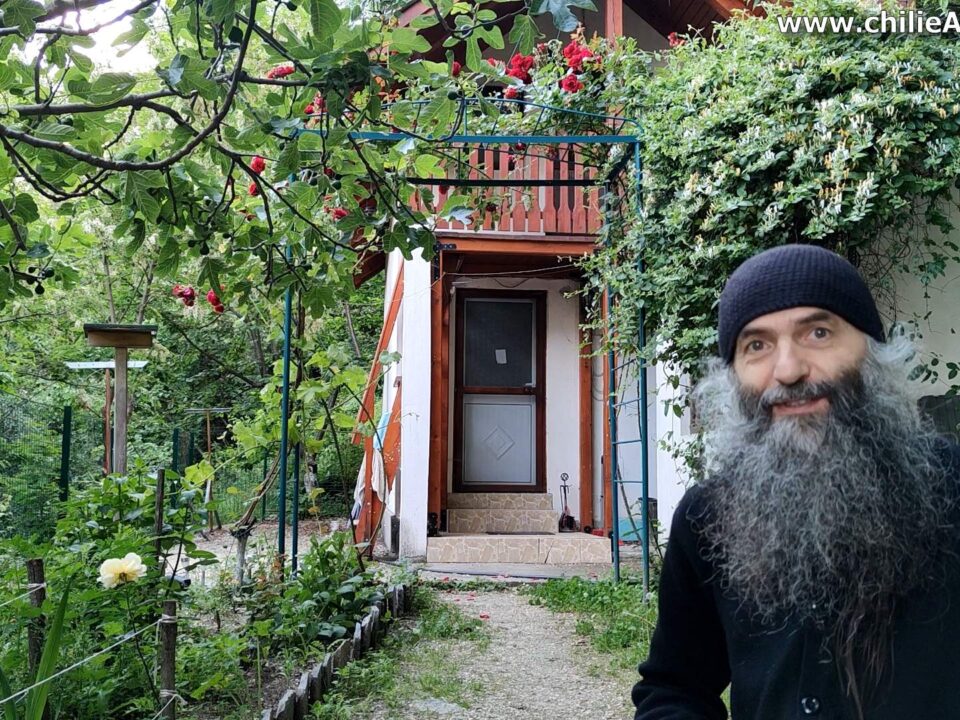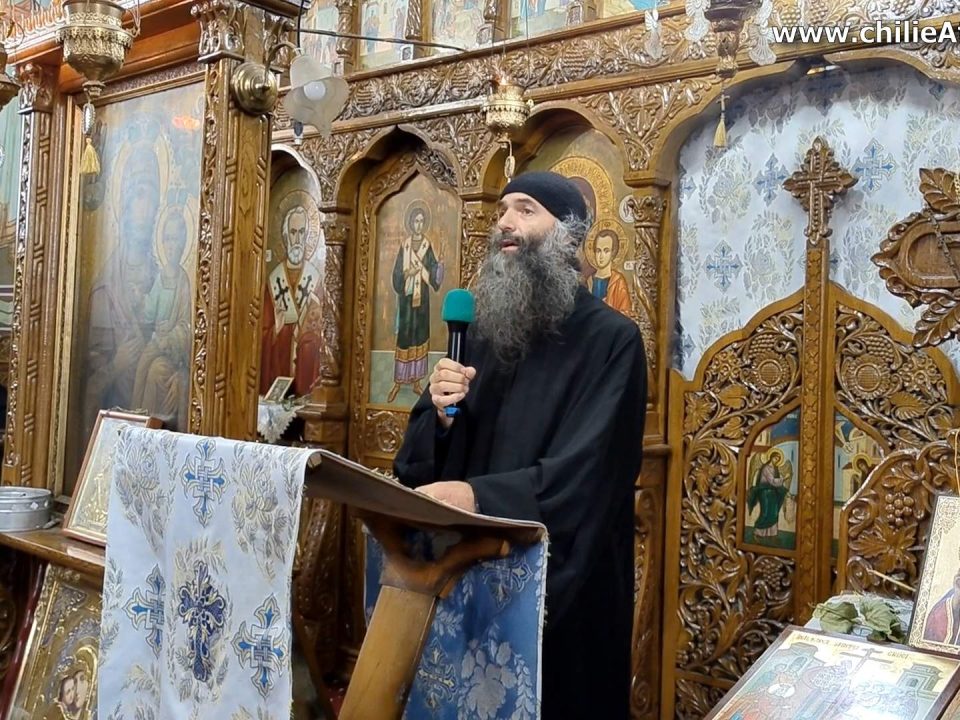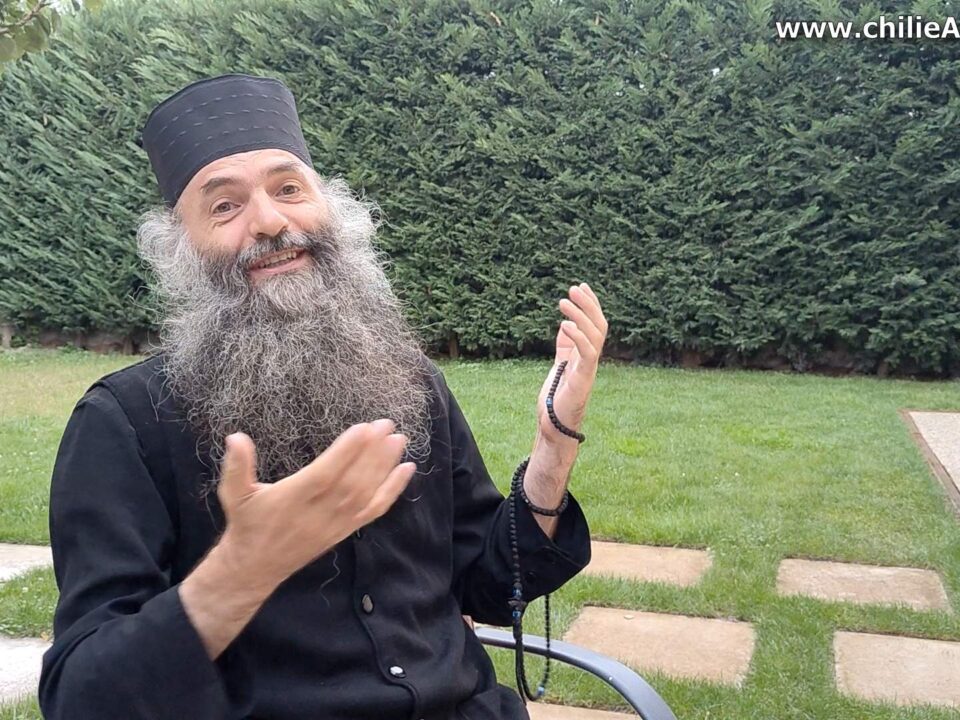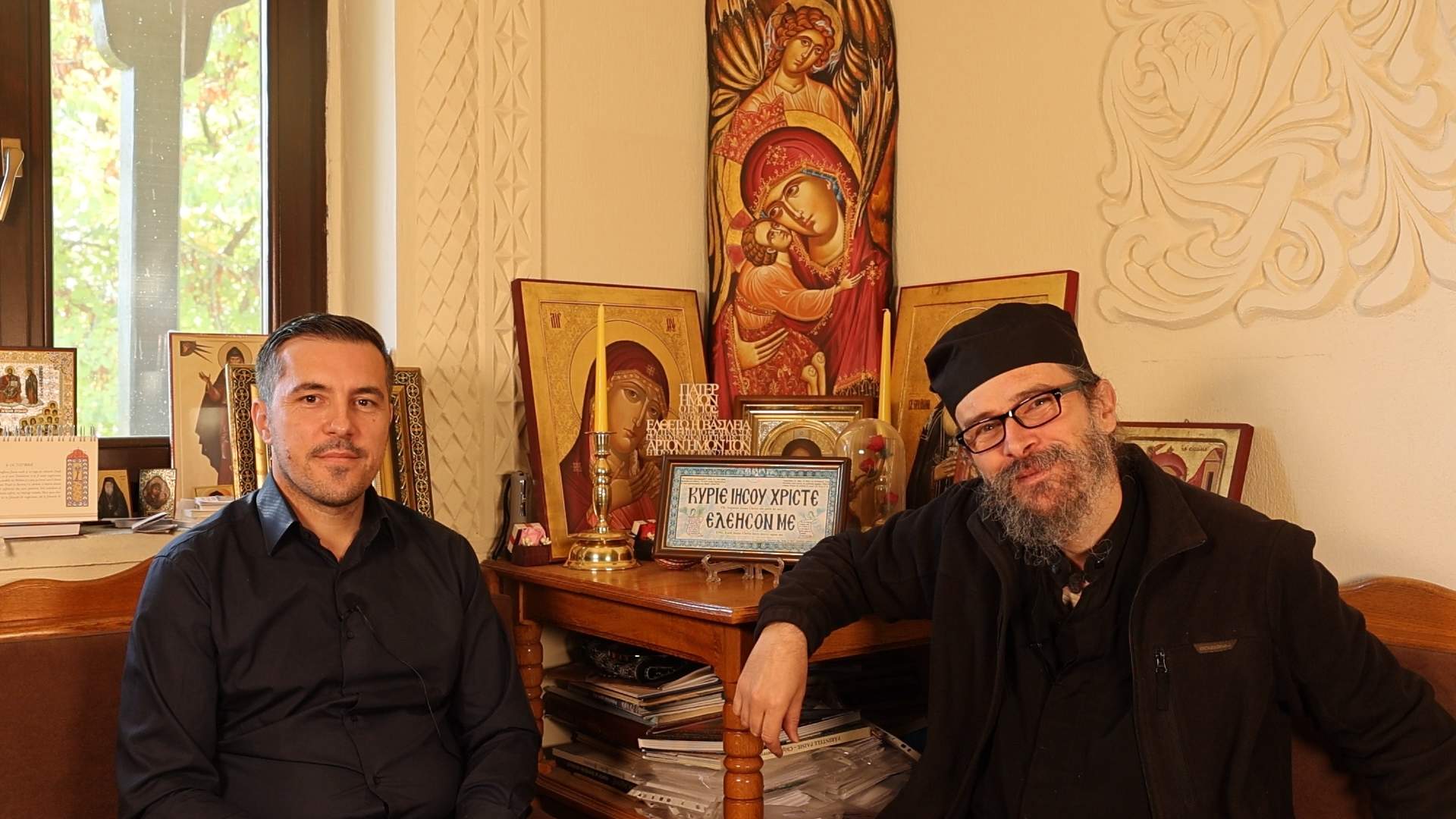
Orthodox Dignity in Politics: Prejudices and Truths – Ciprian Bucur, Father Theologos
23 October 2022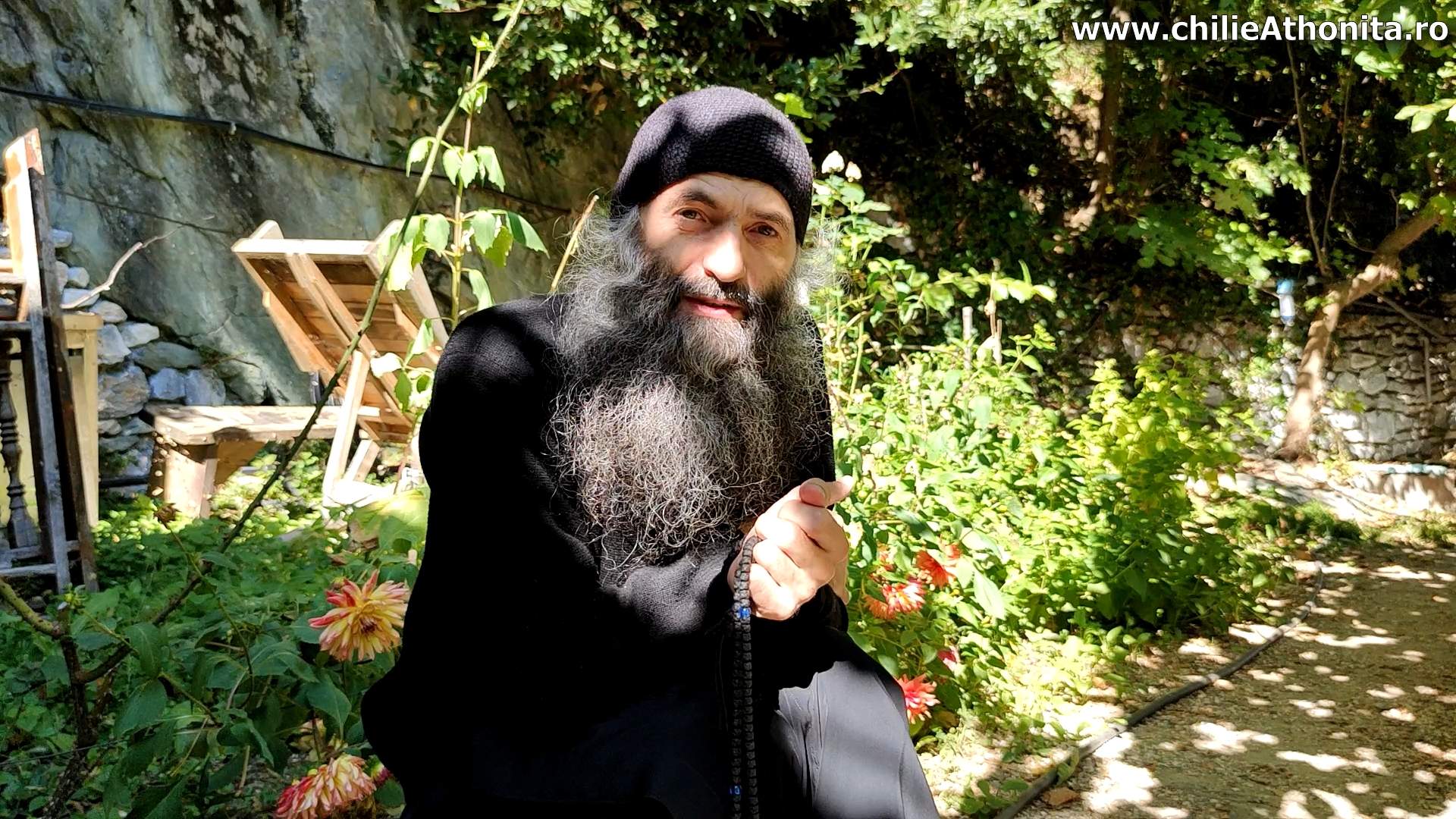
Saint Paisios: Life, Miracles – Father Pimen Vlad
27 October 2022If weeping for God brings peace, then it is really worth analyzing why we weep and how we can weep with spiritual weeping. We also remember the contemporary causes which should soften our hearts and move us to weep – beyond our sins.
By watching this material you will receive some practical advice in this regard. We must find our peace and get rid of the hardness of our hearts.
Enjoy!
Glory to the Father and to the Son and to the Holy Spirit now and forever and onto the ages of ages. Amen. Through the prayers of our Holy Fathers, Lord Jesus Christ, Son of God, have mercy on us. Amen.
We talked in the last episode about crying as a giver of joy, and by that—of course we mean crying for God. What happens is actually similar to the phenomenon in which a mother hides from her child so that he wants her even more, but when she sees that the little one begins to cry, then the mother immediately appears.
This also happens in our relationship with God, and this for roughly the same reasons: that is, we humans are fallen, we are sons of Adam and we think we know everything, that we are doing everything, that we can do it all, and we venture to do everything alone, unaware of the dangers that lurk in front of us. Like a nursling, right?… Even more, we cry out to God, “We don’t need You! You don’t exist!” and then we get entangled in the threads of our logic, in the insurmountable problems, in the inability of our logic to solve the human equation. Understand?
You see that logic is not capable of solving man, but it is quite capable of realizing this helplessness of his. This tension should push man toward faith in God. Unfortunately, however, as I said, most people no longer believe in God, for various reasons—most often because they have been presented with a false god, they have been scandalized, or they do not want to accept the consequences of God’s existence. That is, they do not want to accept the denial of passions, brothers. We want to be embraced with our passions, that’s the problem.
Due to the fact that they no longer believe in God, this tension increases until the nervous system stops resisting and bursts. And then the big problems arise: depression, desperate crying and not the one after God. These are big problems that are solved only by true faith – which has a therapeutic effect.
Heresy – the false god or the more or less false road to God – has no therapeutic effect, due to the fact that it leads nowhere. Thus, problems are not solved. They increase even more as people are prouder, they think they are more capable, they think they are more fit – that is, more atheist. They think they know very well everything that happens to them and how to solve their problems. Brothers, it’s not like that! When I say “atheist” I mean not only avowed atheists, but – in a broader sense – also those who are atheists by their behavior, that is, they have little or no relationship with God. They are Christians only declaratively, only in name and not as a way of life.
Let us not forget that we are on the brink of nuclear war, brothers. Personally, as a monk, I don’t really follow what is happening around the globe, but I find it very difficult to find concrete facts that show Orthodoxy declared or through behavior in certain actions or people that more or less declare themselves Orthodox or, at least, Christians. This is only seen in people here and there, in the case of isolated people. I say this because Orthodoxy is not a party, a current of thought – Orthodoxy is the right way to be, as Father Raphael Noica and many other fathers say, or, the other definition I often say, Orthodoxy is the correct medicine that heals the soul.
Today, those who are in power, brothers, I do not know how Orthodox they are. Understand? Or rather, I know, but let’s not go into details. If those who are still Christians behave this way, then what about Asians, about non-Christians? I don’t know if you know, right now the most powerful weapon in the world – more powerful, more powerful than American planes and Russian tanks is a Chinese-made app – TikTok.
It is a weapon of national importance for them, I have mentioned this before, and all possible scientific knowledge is used to the maximum so as to generate addiction to this application and generate pleasure. It is a form of drug, brothers—a distorted, sinful pleasure to end their minds, that is, not only of the users, but also of their offspring, their children. Of course, this is beyond the fact that it destroys their productivity and ability to pay attention and concentrate. You should know that there are different AI algorithms for China and the rest of the world. Understand? Your cell phone and yourself are spied on as much as possible to make you addicted – facial recognition algorithms are also used to promote what is most addictive, attractive and at as fast a pace as possible.
You know very well that the duration of videos is limited so that the dopamine spurt, the arousal is more and more frequent, faster. Also, comments and headlines are limited to very few characters to limit your thinking, so you can’t express yourself. So that everything is quick, superficial. This is a form of war, brothers. It’s cruel.
For the reasons mentioned above, doctor God – I said God is therapeutic and Orthodoxy is therapeutic – the grace of God who loves us very much, often withdraws pedagogically from the very beginning of our deviation so as to show us that we are not going in the right direction. Safety disappears, enlightenment disappears, love disappears, peace disappears.
The backbone of the fallen Adam, of the old man within us, is egotism, hardness of heart, conceit, [being] puffed-up. I really like the Romanian word for “puffed up” because it shows exactly the phenomenon of darkening of the mind that occurs when one trusts oneself. What we need to do now is stop this rush and turn a little toward ourselves and cry a little, brothers. If neither the threat of nuclear war, nor any weapon of Tiktok’s destructive power makes us think a little, I don’t know what else can make us think about turning back from our evil deeds, to repent, to cry.
We must never tire of always searching ourselves and imagining the depths, the abyss of eternal fire and the ruthless servants, the merciless and unforgiving judge, brethren, so that we may repent a little, soften our hearts a little. We need to think about the boundless chasm of the subterranean flame—these are no illusions. About the narrow downs of frightening, abyssal, subterranean places and pits, brothers, and all these things.
All these as concrete realities, but also as spiritual meanings: some chaotic downs and chasms of almost subcreative, beastly depths. You know very well what I mean. I hope you don’t know, but I think you do. Or of states in which creation is reduced in gradual steps to a diminution of existence, almost becoming shadows of existence. They are steps of shadow that torment precisely through this extreme impassion by a creation devoid of the source of its existence, which is God. This is also a permanence of a listless state of mind – we are slothful, sluggish – devoid of the intensity of living in the fullness of life.
Paradoxically, you young people seek this intensity, but you seek it where it is not, brothers and sisters – that is, in the flesh – and you seek it in the wrong way – that is, through laughter. I am reminded of a quote from Ecclesiastes: “A fool raises his voice in laughter, but a wise man at most smiles a little.” That’s the sign of wisdom: a quiet, barely sketched smile. This is accomplished, brethren, if we think, as I said, of the above, of judgment, of hell, if we keep our minds in hell and do not despair, as St. Silouan the Athonite said.
Because this existential slothfulness that is in our soul – that is, this dissoluteness, brothers, this is what I mean – this existential stagnation may be overcome by trembling and to unite us with purity through the fire of joy-giving weeping. Understand? Crying is a fire and gives birth to joy. Of course I am speaking of spiritual weeping.
I have said that spiritual weeping brings us joy and death in Christ, freedom. Repentance is the way of freedom and death is the gate to life, to resurrection. I did a whole episode on this. This is how we escape war, brothers, not otherwise. We must persist, full of trembling, in the petition of prayer, standing before the Judge, before the Lord as guilty, to extinguish with outward appearance and with inward state the wrath of the Righteous Judge.
That is, we bow our heads, let’s be pious. Let’s not say that others are to blame and we are not. Let’s not try to hide and run away or “set ourselves up” thinking we can get away with our passions. We’re not going to get away. God’s eye is all-seeing, God is all-knowing. You’re not going to escape, brothers.
Let me tell you a little story: St. Porphyrios was at one point with some spiritual children up on the top floor of a very high building and St. Porphyrius said to them: “Now we will go down, a taxi will come, we will get into it, but you will not talk.” They get down, a taxi does come, they get in the car, St. Porphyrios in the front, the other spiritual children in the back. The driver sees that St. Porphyrios is a priest, a monk and begins to mock monks, begins to mock priests: that they are the leeches of society, that they do nothing, that they are lazy and so on.
His spiritual children were boiling in the back, but they could not say anything because Abba told them, St. Porphyrios told them not to say anything. After I don’t know how long the taxi driver kept calling them names, St. Porphyrius said: “Once upon a time, there was a man. And this man had a friend, a neighbor who was very sick. And the friend cared for his neighbor. And he cared for him very much, he worked a lot for his neighbor who was sick, but the devil of the love of money entered the heart of the caregiver and he killed his neighbor and took his fortune – a vineyard – and he sold it. And with the money he took, he became a taxi driver.”
And at that moment the driver steps on the brake and says, “How do you know?” … And then God says through the mouth of St. Porphyrios: “Since my servant knows, I know too.” And St. Porphyrios says, “Since God knows, I know too. Come and confess!”
You see, brothers, God is very delicate – very delicate and waiting for us to repent, but nothing escapes Him. But if we do not repent, brethren, God brings us to the place where our hearts will be broken, where we will humble ourselves – let me tell you another story, from the same Saint Porphyrios.
At one point a group of worshippers come to Saint Porphyrius, among whom was a brother who gives an icon to St. Porphyrius as a gift. St. Porphyrios was blind due to old age and began to caress the icon: What a beautiful, extraordinary icon, thank you very much for the icon! May the good Lord bless you!”
And the brothers say: “Glory be to God, Father Porphyrios, tell us a useful word!” But Father Porphyrios kept himself busy with the icon: “Extraordinary icon! But who did it? Who was in charge of it? Phenomenal icon!”
One brother says, “Me, Father. Bless! Give us a word!”
“Phenomenal icon! Extraordinary icon! But how did you do it, how did you glue it?”
The icon was paper glued to a piece of wood. And the brother says: “Leave it, father, tell us a word! It’s not a big deal. I put glue, placed the sheet and it stuck.”
“Phenomenal! Phenomenal! But how did you put the glue, how did you glue it! Extraordinary, how good it is…!”
“Father, forget it! Okay, I spread the glue, put the paper on, and it stuck.”
“But how well it is glued, how did it stick so smoothly…?”
“Father, leave it, tell us a word!”
“The icon is extraordinary, but how did you glue it?”
“Father, leave it. How did I glue it? I put it down, I put glue, I put paper, I put a piece of wood and I climbed up with my feet to press!”
“Well, see!” – says St. Porphyrios. “Don’t do that again!”
Understand? St. Porphyrios had discovered from God that the brother in question climbed with his feet on the icon, that is, he put a piece of wood, climbed with his feet to press down the paper to stick it well. And St. Porphyrios slowly brought the brother to confess publicly, he said it publicly. Understand? God is very delicate, but He is not to be mocked.
Brethren, we must weep, for the Lord cannot overlook the widowed soul, which stands sorrowfully before Him and gives labor to the tireless One – that is, to God. Understand? God does not mind our persistent prayer, but on the contrary, He rejoices because He knows that we feed ourselves in this way.
But let’s be careful not to hurt people. The moment someone asks us for help, let us give help with discernment, of course, but let us pray extensively. And when we help others, let us pray at length! Because the soul is nourished by God’s grace that comes – beyond the Holy Mysteries – through good works, of which prayer, confession and weeping, inner mourning are in a place of honor.
You should know that for the one who has won the tear of the soul, the whole place is suitable for prayer because he has this flame within him. Grace is in him as the child in the womb of the mother, and he who has this gift feels life within him.
However, you know how it is: just as the treasure that is hidden deep in the ground is safer than the one shown in the market and it is not stolen, so is hidden virtue safer than virtue displayed. Sometimes fathers went to great extremes to hide their virtue, you know. They even said that virtue shown is no longer virtue. Let me give you an example.
At one point the great fathers of the desert came to the Skete and told the Abba of the Skete that they wanted to see all the fathers in the Skete. “Abba, we want to see all the fathers in the Skete.”
Now, you know how it is… Everyone in the Skete is good, but some have their quirks… There are some dry trees in every forest… and because of this Abba called a brother aside and said, “You will take the great fathers through the Skete, but don’t take them to the crazy one.” Because there was one who was crazy in the Skete, who sat in the dust and played with pebbles. He collected pebbles all day and put them in two piles. Again he would collect them, and put them in two piles. “Don’t take them there, because people will be scandalized when they see this guy wasting his time all day!”
And the brother said, “Bless, father!” He went, he took them all to all the cells, they came back, and when they were about to leave, Abba said, “Was it nice in the Skete?”
“Yes, very nice. But know that you didn’t take us to all the fathers in the Skete.” And they left.
Then Abba was shaken and called the brother and said, “Did you take them to all the cells?” “Father, I have taken them to all except the one who, as your Holiness said, they should not see as it is not nice…”
Then Abba immediately went to that brother and said, “What is your work, what are you doing?” And [that brother] kept laughing, pretending to be a fool. Abba pressed him greatly, and at last it was revealed who this man was. What was he doing? He was searching his thoughts. He would watch every thought that came into his mind, and if a good thought came, he would put a pebble on the right. If a bad thought came, he would put a pebble on the left. And if there were more pebbles on the left than on the right, he would not eat that day. Brethren, this is inhuman asceticism. Don’t do that as you will lose your mind and starve. Understand?
The brother did this to hide his maximum watchfulness and inner mourning and to not be disturbed so that he could think about death all the time and that he could starve to death that day if he does not have good thoughts. Thus he kept himself in a constant state of watchfulness. The father was not playing, brothers. Understand?
This is how St. John Climacus advises us not to be like those who bury their dead, who now mourn them and now get drunk for them. On the contrary, let us be like those bound in chains – as we are – and we are constantly whipped by executioners, tormentors. The tormentors and the executioners are the thoughts, brethren, sometimes even people, our fellow human beings, as the beneficent God allows. It’s not that they’re bad, it’s that God wants to soften our hearts. If someone advances then it may even be the enemy – the devil – who fights directly, but the devil is driven away by the sign of the cross, obedience, confession and inner mourning, crying – today’s subject.
Yes, brethren, he who now cries and later delights and laughs is like one who throws bones and bread at the dog of love of pleasure; That is, he pretends to drive him away when, in fact, he calls him. Let it not be today one way, tomorrow the other!
We must gather our mind and not love to be seen; we must go out towards our heart, and there be seen by the Lord. It’s true that this will be very hard to obtain, and that’s not because it’s truly hard to obtain by our nature, but because devils fear the gathering the mind like thieves fear dogs, and they’re going to fight fiercely so that man doesn’t gather his mind.
So, brothers, the enemy is going to do everything possible to prevent this from happening. You must know that when man has his mind gathered, then he begins to see God and man begins to experience the connection with Him, which satisfies the heart so much that man begins to gush tears from his heart and from his mind.
Man’s mind delights so much that all human existence clings to God and can no longer be detached from Him. These experiences cannot be forgotten for life, and they nourish man all his life, and bring man out of the mire of doubt, of unbelief.
Let me give you a case. Saint Paisios when he was little was very pious and his brother envied him and wanted to separate Him from Christ and harm him. One day he discussed this with a friend who believed in Darwin’s theory – that man came out of the ape. And his friend said, “Let me get him out of all this stuff for you.” And he went to little Arsenios, the future St. Paisios, and said to him: “Christ was a good man, but you cannot say that Christ was really God, no, no way. He was one of the great initiates like Confucius, Buddha. He wasn’t God because man came out of the ape.” And he explains the whole theory of Darwin.
Little Arsenios was totally destroyed in his inner universe and he had brutal thoughts of doubt and went to a small chapel of St. Barbara that was on the outskirts of the village, and cried there continuously…. He said, “Lord, I believed in You, that You are God, that You can save us, that You are the Savior and You are not, Lord. Help me! What am I going to do now?” And he kept crying for hours alone there, in the chapel. And at a time when St. Paisios could no longer cry and so on – little Arsenios, the future St. Paisios said, with all his existence:
“Lord, I don’t know if You are God or not, but because You have been so good to us, I still love You! I still love You!”
And then, brethren, the royal doors opened by themselves and our Lord Jesus Christ the Living appeared there. He appeared alone in the royal doors and He had in His hand a gospel on which were written some words. And the Savior says those words: “I am the resurrection and the life. He who believes in Me, though he may die, he shall live.” And the Lord disappears. And then the whole war passes for the future St. Paisios, the little Arsenios. And St. Paisios says, “Now let someone come to me and tell me that man has come out of the ape!” Understand?
You see, brethren, that the weeping and seeking of God to the ends of our existence finds God, because the uncreated and transcendent God appears beyond the limits of our created existence.
Brethren, here on earth we are not called to weddings. That will be in heaven. Here on earth we are called, without fail, to lament our sins. Now, you should know that some people force themselves not to think about anything in the happy moment of crying. This is not good, brothers, because we are rational beings and therefore analogous thought is needed. We don’t have to banish the thought of death, of our sinfulness, of our longing for God, or anything else in order to cry because only beasts cry for irrational causes – mechanical causes because they were hit or chemical causes from a substance that does harm. For weeping to be spiritual, to be pleasing to God, it must be meaningful and for a cause pleasing to God.
Here the thought of death is very, very good. We’ve talked about this before. For example, the moment we lie down in bed imagine that we lie down in the grave and then we will acquire, on the one hand, a seriousness of mind, and on the other hand we will sleep less and lighter. The same goes for food, St. John Climacus says that if at the moment we eat we remember that we too will be food for worms, we will eat less. Let’s not eat like animals!
Of course, the greatest gathering – withdrawal – is not from food and sleep but from selfishness, from our own will, and thus we will gain freedom, we will gain power even in the face of reproach. It is true that we acquire great power, but theology and teaching do not suit our state of weeping. Because trying to be a teacher dispels crying, if of course being a teacher is not from God, if God does not validate us. You know how it is: the teacher sits in front of the class while he who cries is on garbage in a sack.
Let us take care that our weeping does not mix with the tear of vainglory, brethren, because that is without grace, all grace departs. Even worse with the tears that come from wounded pride, anger, or wounded selfishness. These are alien to God. What fellowship does darkness and light have? As it says in Scripture.
Let us beware, then, because the fruit of false piercing is self-esteem, brethren. We think we are someone who has tears, that we have advanced… Understand? This is like the one who has taken a sword from the Lord and kills himself with it, commits suicide. This is especially if he judges others and sees them as inferior because they don’t have tears.
Brethren, we must be simple and sincere both in our conduct and in our prayer and in our tears. Brethren, we do not impress God because everything is from Him. Including the gift of tears. He can take it away from you and you become like a stump. God is Father, my dear ones, and He does not need our tears. We need them to heal our wounds. God wants man rather to rejoice in love for Him and in the inner joy of the soul.
The one who has true piercing is comforted by the Lord and feels safe like a little chick. The moment we weep at the thought of eternal fire and weep at the thought of the joy and happiness of Heaven, then everything on earth will seem secondary to us, including the war that is about to begin. But if we do not have our minds on the heavenly things, we will try to avoid crying, then we will feel hounded and dissatisfied even in peacetime without anyone watching us. That is, we take it easy and in fact, we feel dissatisfied no matter what.
Brothers, it’s not hard! It is not difficult because our good and righteous Judge will surely take into account, as in everything he judges, our power or powerlessness. Likewise it will be for tears. Yes, brothers. You know, there are little drops of tears, like blood, shed with pain; and there are streams that flow abundantly without pain and effort. Now, I judge those who labor more by their pain than by quantity. And I think so does God.
So help us God! Through the prayers of our Holy Fathers, Lord Jesus Christ, Son of God, have mercy on us. Amen.
Online commemoration lists and donations
May the Lord help us!
Online Commemoration Lists and Donations
May the Lord help us!
If you have a bank card and wish to send commemoration lists and donations online using your card, and/or to support our philanthropic activity, including this site, please fill out the form below to make a small donation. The form is secure – we use Stripe for payment processing – a world leader in this field. We do not collect your personal data.
If you do not have a card, or do not wish to use it, visit the webpage for Online Donations and Commemoration Lists.
We will pray for your loved ones! (Please do not include inessential details like wishes, degree of kinship, introductions etc. JUST the name!)
Especially for recurring commemoration lists, we ask that you please keep them to under 20 names long. If you include a member of the family, we add “and for their families.”


